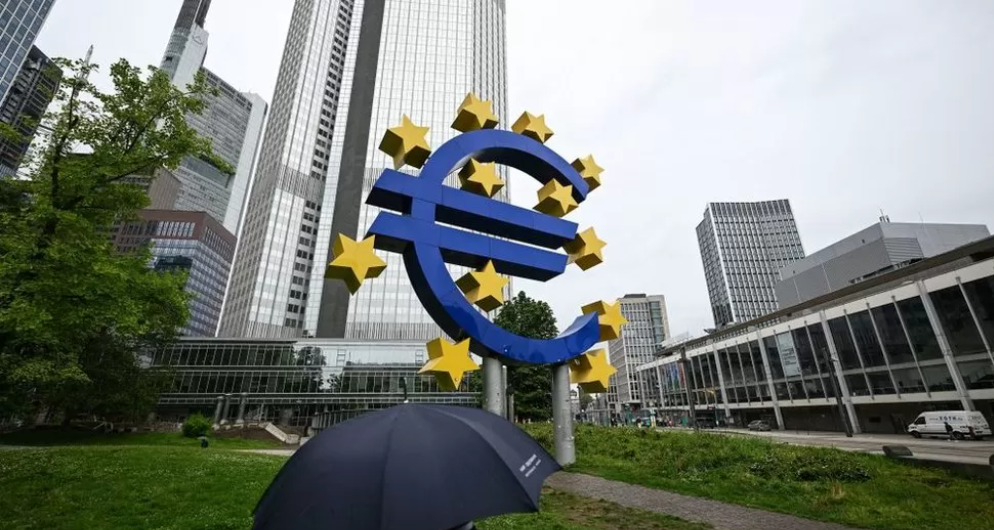The European Central Bank (ECB) increased interest rates in the Eurozone to a record level.
The bank cautioned that inflation was “expected to remain too high for too long” and increased its benchmark rate for the tenth consecutive rise, to 4% from 3.75%. The most recent increase happened after predictions stated that inflation, or the rate at which prices grow, will be 5.6% on average in 2023. However, the ECB hinted that Thursday’s increase might be the last for the time being.
“The governing council considers that the key ECB interest rates have reached levels that, maintained for a sufficiently long duration, will make a substantial contribution to the timely return of inflation to the target,” the bank stated.
In addition, it predicted that by 2025, inflation in the 20-nation bloc would have decreased to 2.2%.The eurozone has been impacted, like other regions of the world, by rising food and energy prices that have tightened household budgets.

The ECB declared that it was committed to seeing inflation reach its target of 2% in a “timely manner”. However, policymakers acknowledged that the impact of increased rates has “significantly” reduced their estimates of the bloc’s economic growth. The ECB’s message around its most recent decision, according to economists at Pantheon Macroeconomics, was a “clear indication” that rates would not increase further.
Also Read: UAW And Automakers Are Being Issued A Severe Warning By The Former CEO of Ford – 2023
“We now see a high bar for anything other than a holding operation in the October and December meetings,” they declared. Although the ECB is currently in no position to even consider that possibility, looking further out, we still see a small window for rate decreases next year.

Further rate increases are not out of the question, according to ECB President Christine Lagarde, who added that the “focus will shift, going forward, to the duration, but that is not to say – because we can’t say that now – that we are at peak.” The eurozone entered a recession last winter, according to updated data released in June. The European economy’s largest economy, Germany, revised data that led to the downturn.
Generally speaking, a recession occurs when the economy contracts for two consecutive quarters of three months. An economy that is shrinking could be terrible for company and lead to job losses.
Know more About Eurozone
The 20 member states of the European Union (EU) that have made the euro (€) their sole legal tender and, as a result, fully implemented EMU rules make up the euro area, also known as the eurozone (EZ).
The 20 eurozone members are:
Austria, Belgium, Croatia, Cyprus, Estonia, Finland, France, Germany, Greece, Ireland, Italy, Latvia, Lithuania, Luxembourg, Malta, the Netherlands, Portugal, Slovakia, Slovenia, and Spain.
Bulgaria, the Czech Republic, Denmark, Hungary, Poland, Romania, and Sweden are the EU’s seven non-eurozone members. Despite being forced to join once they achieve the euro convergence standards, all save Denmark continue to use their respective national currencies.Andorra, Monaco, San Marino, and Vatican City are among the non-EU members that have legal arrangements with the EU to use the euro as their official currency and produce their own coins.

Additionally, Kosovo and Montenegro unilaterally accepted the euro.However, none of the institutions in the eurozone represent these six nations.
The European System of Central Banks is in charge of fostering monetary and fiscal cooperation between EU states who are in the eurozone and those who are not. The Eurosystem is the informal group of finance ministers that formulates fiscal policy for the currency union. The European Central Bank (ECB) establishes the eurozone’s base interest rate, decides on monetary policy, and prints and distributes euro banknotes and coins.

The eurozone has designed and implemented measures for providing emergency loans to members in exchange for enacting economic reforms during the financial crisis of 2007–2008.Additionally, the eurozone has implemented a limited degree of fiscal integration, such as peer review of one another’s national budgets. In terms of what additional provisions will be agreed upon for the eurozone transformation, the subject is political and in a state of flux. There are no provisions for leaving the eurozone or being ejected, and no member state has done so.
Also Read: According To A Study, Return Fraud, Bots, And Coupon Stacking Cost Retailers $100 Billion Annually
image source :google




































